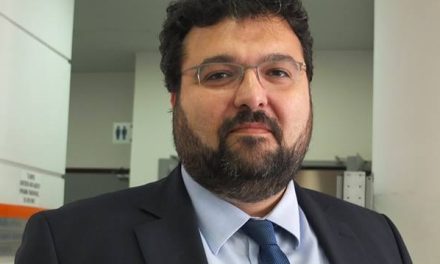As Greece is gradually adapting to the new normality that COVID-19 will impose, dr. Christos Michalakelis, President of the Study in Greece Organization, explains in his interview with Greek News Agenda* what comparative advantages studying in Greece has to offer to foreign students. Greece’s effective management of the pandemic, its Mediterranean climate, the high-level curricula, as well as the low fees and the post-Brexit reality are only a few of the parameters that have to be taken into consideration by foreign students, and Study in Greece aims at diffusing them to a global public.
Dr Christos Michalakelis is an Assistant Professor at the Department of Informatics and Telematics, Harokopio University of Athens. He specializes in techno-economics and assessment of ICT and high technology investments, like cloud computing and the Internet of Things (IoT). He teaches courses related to telecommunications, investment assessments in high technology markets, the economics of digital technology, mathematics, etc. He has previously worked for many years with the Greek Ministry of Education, as an IT manager, where he had participated in several projects concerning the design and implementation of information systems.
 He is co-founder and the President of Study in Greece, the official initiative of Greece (Hellas) aiming at the promotion and support of internationalization and extroversion of higher education. Study in Greece is a not-for-profit organization focusing on the promotion of educational opportunities and activities in Greece for international students, the provision of information for studying and living in Greece and the development, support and implementation of educational programs and activities, acting as a cultural and educational bridge between Greece and other countries. Study in Greece is under the auspices of the Ministries of Foreign Affairs, Education and Religious Affairs, and Tourism.
He is co-founder and the President of Study in Greece, the official initiative of Greece (Hellas) aiming at the promotion and support of internationalization and extroversion of higher education. Study in Greece is a not-for-profit organization focusing on the promotion of educational opportunities and activities in Greece for international students, the provision of information for studying and living in Greece and the development, support and implementation of educational programs and activities, acting as a cultural and educational bridge between Greece and other countries. Study in Greece is under the auspices of the Ministries of Foreign Affairs, Education and Religious Affairs, and Tourism.
What was the rationale for introducing Study in Greece Organization and what has the outcome been so far?
Our first and principal aim was to contribute to the internationalization of the Greek academic world by creating a portal of information, where foreign students interested in studying in our country could easily find all information related to the undergraduate and postgraduate programs and other study options offered by Greek universities, as well as useful information concerning living in Greece, thus acting as a “one-stop-shop” of information.
Study in Greece places emphasis on the English-taught programs offered by Greek Universities and other educational activities targeting the international audience. The action merits the auspices of the Greek state, which has early recognized the added value of the offered services. We are very happy to observe that the Greek state’s mentality is totally compatible with this spirit of openness and extroversion which characterizes our organization. As a matter of fact, within this enhanced framework, thanks to the strategy of internationalization adopted by the Ministry of Education and Religious Affairs, the role of Study in Greece has been upgraded.
Nowadays, Study in Greece cooperates with all Greek universities and constitutes the official bridge which connects the Greek academic world with the international academic universe, not only by informing but also through the organization of conferences, Study Abroad programs, summer schools and other activities, which aim to accompany and promote the programs and activities of Greek universities.
 Could you please elaborate on the English speaking postgraduate programs?
Could you please elaborate on the English speaking postgraduate programs?
English-taught postgraduate programs offered by Greek public universities, offering many perspectives to both institutions and students, constitute the key to this internationalization initiative mentioned above.
Eighteen universities in Greece offer about 140 Masters Programs taught in a foreign language (mainly English), in many cities and regions across Greece, like Athens, Thessaloniki, Heraklion, Lesvos, Volos, Crete, Peloponnese, etc., awarding degrees over a wide range of disciplines including, apart from Classics, Engineering, Humanities, Social Sciences, Medical studies, Technology, Economics, Business, Art, Music, Nutrition, and many others. This should be emphasized more, since there may be a wrong perception that Greece provides only studies focusing on Classics, which is not the case, since Greece is making substantial and continuous progress in scientific fields like the ones mentioned above, offering study programs of high quality. It should also be noted that the number, as well as the range of disciplines, of the English language programs, are expanding, as the universities have understood the importance of internationalization and extroversion.
Teaching methods vary between different fields and subject-specialisms, comprising large-group lectures as well as smaller seminar discussion groups and supervised practical work. Collaboration with other institutions (or their faculty) is not uncommon as Greek Master’s degrees emphasize expert teaching and professional training.
The main “problem” related to these programs, is that they lack international promotion, as there is low international awareness, despite the high quality of education they offer. Here comes Study in Greece, which has as its main mission the promotion and the raising of awareness about studies in Greece and the offered programs. Regarding the postgraduate studies, we have created an e-book, which includes a panorama of English language master’s programs in Greece. There, one can find all the program titles along with the appropriate information for each program, including application, fees, etc. Also, Study in Greece, in collaboration with the Greek Ministry of Education, has developed an electronic platform to host the Master’s Programs.
 What are the fruits of the project so far?
What are the fruits of the project so far?
Fortunately, the quality of those programs is well appreciated by the international academic community and we observe a fast-growing interest of foreign students, particularly coming from the USA and China, who want to obtain a degree from a Greek higher educational institute, or participate to short term courses, like Study Abroad programs and Summer Schools. This category of programs – Study Abroad and Summer Schools – organized by diverse Greek universities attracts more and more the academic public. We, Study in Greece, in collaboration with the Greek state, have succeeded in communicating the efforts of the Greek universities on a global scale, through our developing international network. Of course, there is a lot of work to be done to take Greek Academia where it deserves to be.
The breaking news is that the Ministry of Education is working on innovative legislation that will, among others, allow the universities to offer English taught undergraduate programs for international students, provide joint programs with international universities, etc., with very simple and quick procedures. This is expected to be voted soon by the Greek Parliament and become a law of the Greek state, boosting, even more, the internationalization of Greece and its selection as an international study destination.
 What are the competitive advantages of studying in a Greek University for a foreigner?
What are the competitive advantages of studying in a Greek University for a foreigner?
As we all know, Greece is a beautiful country, with great sunny weather, magical landscapes, and rich cultural heritage. The quality of life, the attractive climate, and the classical sites are aspects that should not be underestimated, but they aren’t all Greece has to offer. The country is also a vibrant research centre, with ongoing work in theoretical fields such as archaeology and classics as well as in scientific fields such as medicine, biology and physics, and technology disciplines like IT, computer, and engineering, among others.
The high-quality education offered by the Greek institutions across a broad spectrum of subjects and the proud tradition of scholarly inquiry – Greece has an academic heritage like few other countries in the world, having been home to the likes of Socrates, Plato, Aristotle, Hippocrates, and Pythagoras are two basic reasons to studying in Greece.
Furthermore, Greece is a member of the EU and participates fully in the modern European Higher Education Area. Plus, the cost of living in Greece is at a very low level, as compared to many other European nations, especially in the post–Brexit era.
To sum up, Greece is a particular place that harmoniously combines research, recreation, and reflection and connects the legendary past with the evolving present, providing a value for money destination.
 What are the opportunities Greece offers to foreign researchers and what are the most important research projects?
What are the opportunities Greece offers to foreign researchers and what are the most important research projects?
There is a general misunderstanding as far as it concerns the type of research in Greece and I am glad to admit that the Greek academic world has managed to surpass the traditional clichés. Research in Greek universities covers classical studies and surpasses it by being at the same time classical and contemporary, aligned with the spirit of our times. As I have already mentioned above, Greek universities offer foreign researchers the opportunity to develop their research projects in traditional scientific fields such as medicine, biology, and physics, without forgetting the humanities – philosophy, history, sociology, and theatre. Furthermore, and that’s, in my opinion, very important and optimistic, Greece provides a friendly and fertile environment for the students who want to delve into cutting edge subjects such as artificial intelligence, internet of things, 4th industrial revolution, computer science, as well as to some of the most crucial matters of the contemporary world like immigration.
 Are there synergies between Greek Universities and foreign institutions?
Are there synergies between Greek Universities and foreign institutions?
Yes indeed, there are already many and there used to be much more active. During the last decade, Greek universities expanded their networks by adopting a continuously globally-oriented attitude and the academic society became more extroverted.
However, because of the economic recession, Greece faced during the last years, many of these synergies fell into an inactive state. It is of paramount importance that there is a need to reactivate the existing synergies and create many more as, among the many other benefits, they can contribute to the economic support of the universities and the society in general. Thus, it can be taken for granted that Study in Greece, acting as a diplomat of the academic world, through its growing network, is willing to contribute to this effort by providing valuable assistance to Greek institutes of higher education that are seeking to develop or find partners abroad.
 Greece has so far successfully addressed the COVID-19 pandemic. Will that reflect on attracting foreign students?
Greece has so far successfully addressed the COVID-19 pandemic. Will that reflect on attracting foreign students?
I think that despite the difficult circumstances with the negative impact of COVID19 on social and economic life worldwide, our country – Greece will find its way to light. The way we managed as a State and a society to handle this severe crisis will constitute the paradigm in a new era of challenges. We have to capitalize on this precious success and instil our courage and our creativity into developing sectors like the one of internationalization of education and academic and educational tourism, as they have a lot to offer to the extroversion of Greece and, consequently, to our economy. We should and we can promote the material and immaterial values of our country and civilization, in order not only to attract tourists but to educate citizens of the world. And be sure that Study in Greece will be at the front line of this effort.
* Interview by Florentia Kiortsi
Visit: Study in Greece e-book of English speaking master’s programs in Greece and the electronic platform of Master’s Programs.
Read also: International educational programmes for foreign students in Greek Universities, Study Classical Greece in Athens, e-Academia: Learn Modern Greek online, Study in Greece: Summer Schools 2020















